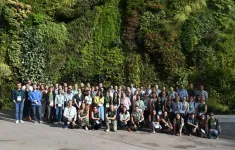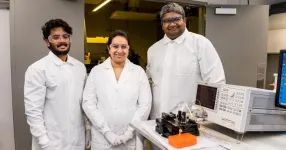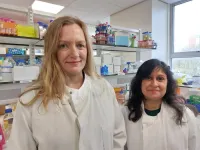(Press-News.org) It can be a relief to scratch the occasional itch, but when itch gets out of control, it can become a serious health problem. How does the body know when to stop?
Scientists at UC San Francisco are getting close to an answer. In a breakthrough that could transform how doctors treat conditions from eczema to allergies, they have discovered a feedback loop centered on a single immune protein called IL-31 that both causes the urge to itch and dials back nearby inflammation.
The findings, published on October 13th in Science Immunology, lay the groundwork for a new generation of drugs that interact more intelligently with the body’s innate ability to self-regulate.
Previous approaches suggested that IL-31 signals itch and promotes skin inflammation. But the UCSF team discovered that nerve cells, or neurons, that respond to IL-31, triggering a scratch, also prevent immune cells from overreacting and causing more widespread irritation.
“We tend to think that immune proteins like IL-31 help immune cells talk to one another, but here, when IL-31 talks to neurons, the neurons talk right back,” said Marlys Fassett, M.D., Ph.D., UCSF professor of dermatology and lead author of the study. “It’s the first time we’ve seen the nervous system directly tamp down an allergic response.”
The discovery could eventually change how asthma, Crohn’s and other inflammatory diseases are treated, due to IL-31’s presence throughout the body.
“IL-31 causes itch in the skin, but it’s also in the lung and in the gut,” said Mark Ansel, Ph.D., UCSF professor of immunology and senior author of the study. “We now have a new lead for fighting the many diseases involving both the immune and nervous systems.”
More than an itch
IL-31 is one of several “itch cytokines” because of its ability to instigate itch in animals and people. Fassett, a dermatologist and a researcher, has wanted to know why since she arrived at UCSF in 2012, a few years after its discovery. She reached out to Ansel, a former colleague and asthma expert who welcomed her into his lab.
First, Fassett removed the IL-31 gene from mice and exposed them to the house dust mite, a common, itchy allergen.
“We wanted to mimic what was actually happening in people who are chronically exposed to environmental allergens,” Fassett said. “As we expected, the dust mite didn’t cause itching in the absence of IL-31, but we were surprised to see that inflammation went up.”
Why was there inflammation but no itching? Fassett and Ansel found that a cadre of immune cells had been called into action in the absence of the itch cytokine. Without IL-31, the body was blindly waging an immunological war.
A balance of forces
Ansel and Fassett then homed in on the nerve cells in the skin that received the IL-31 signal. They saw that the same nerve cells that spurred a scratch also dampened any subsequent immune response. These nerve cells were integral to keeping inflammation in check, but without IL-31, they let the immune system run wild.
The findings squared well with what dermatologists were increasingly seeing with a new drug, nemolizumab, which blocked IL-31 and was developed to treat eczema. While clinical trial patients found that the dry, patchy skin of their eczema receded on the drug, other skin irritation, and even inflammation in the lungs, would sometimes flare up.
“When you give a drug that blocks the IL-31 receptor throughout the whole body, now you're changing that feedback system, releasing the brakes on allergic reactions everywhere,” Ansel said.
Fassett and Ansel also found that these neurons released their own signal, called CGRP, in response to the itch signal, which could be responsible for dampening the immune response.
“The idea that our nerves contribute to allergy in different tissues is game changing,” Fassett said. “If we can develop drugs that work around these systems, we can really help those patients that get worse flares after treatment for itch.”
Fassett recently founded her own lab at UCSF to tease apart these paradoxes in biology that complicate good outcomes in the clinic. And Ansel is now interested in what this itch cytokine is doing beyond the skin.
“You don't itch in your lungs, so the question is, what is IL-31 doing there, or in the gut?” Ansel asked. “But it does seem to have an effect on allergic inflammation in the lung. There’s a lot of science ahead for us, with immense potential to improve therapies.”
About UCSF: The University of California, San Francisco (UCSF) is exclusively focused on the health sciences and is dedicated to promoting health worldwide through advanced biomedical research, graduate-level education in the life sciences and health professions, and excellence in patient care. UCSF Health, which serves as UCSF's primary academic medical center, includes top-ranked specialty hospitals and other clinical programs, and has affiliations throughout the Bay Area. UCSF School of Medicine also has a regional campus in Fresno. Learn more at https://ucsf.edu, or see our Fact Sheet.
###
Follow UCSF
ucsf.edu | Facebook.com/ucsf | YouTube.com/ucsf
END
Could the nerve cells that scratch be the solution for itch?
2023-10-13
ELSE PRESS RELEASES FROM THIS DATE:
Research shows wildfire smoke may linger in homes long after initial blaze
2023-10-13
Newly published research on indoor air quality from Colorado State University shows wildfire smoke may linger in homes long after the initial blaze has been put out or winds have shifted.
The findings, published in Science Advances, show that wildfire smoke can attach to home surfaces like carpet, drapes or counters – extending the exposure for those inside and potentially causing health problems even after an initial cleaning activity by air purifiers. However, Professor Delphine Farmer said the research also shows that simple surface cleaning – like ...
Targeting a coronavirus ion channel could yield new Covid-19 drugs
2023-10-13
CAMBRIDGE, MA -- The genome of the SARS-CoV-2 virus encodes 29 proteins, one of which is an ion channel called E. This channel, which transports protons and calcium ions, induces infected cells to launch an inflammatory response that damages tissues and contributes to the symptoms of Covid-19.
MIT chemists have now discovered the structure of the “open” state of this channel, which allows ions to flow through. This structure, combined with the “closed” state structure that was reported by the same lab in 2020, could help scientists ...
Kentucky Children's Hospital to expand specialized services at new facility in Lexington
2023-10-13
LEXINGTON, Ky. (Oct. 11, 2023) — On Tuesday, Oct. 10, a ribbon-cutting ceremony signified the official opening of Kentucky Children’s Richmond Road, the new home of four pediatric specialty clinics. This facility will offer a continuum of care to infants, children and adolescents with complex medical and behavioral needs.
“The mission of Kentucky Children’s Hospital has always been to provide the most advanced, comprehensive care to our patients and their families without them having to travel far from home,” said Scottie B. Day, M.D., physician-in-chief ...
Advancing solutions: SELINA gathers members and stakeholders for the second thematic workshop
2023-10-13
The second SELINA thematic workshop took place from 2-5 October 2023 in Madrid, Spain, hosted by SELINA’s partner Rey Juan Carlos University. This hybrid event with the theme "Advancing solutions" (for mapping, assessment and accounting of ecosystems and their services) brought together over 100 participants (15 of them online) from all 27 EU member states, Israel, Norway, the UK and Switzerland. Apart from the SELINA partners, the event was also attended by the SELINA Advisory Board members ...
University of Kentucky awarded $3.4 million to lead equity initiative in drug abuse research
2023-10-13
LEXINGTON, Ky. (Oct. 11, 2023) — The University of Kentucky has been selected as the nationwide coordination center for a National Institutes of Health (NIH) initiative. Danelle Stevens-Watkins, Ph.D., will lead the National Institute on Drug Abuse (NIDA) Racial Equity Initiative as principal investigator. The project is supported by a $3.4 million, five-year NIDA grant.
The UK Racial Equity Initiative Coordinating Center will be a national resource for researchers receiving funding to address health disparities ...
Three Johns Hopkins Medicine faculty members elected to National Academy of Medicine
2023-10-13
Three faculty members at the Johns Hopkins University School of Medicine have been elected to the National Academy of Medicine (NAM), an independent organization made up of leading professionals from multiple fields, such as public health, medicine, and natural, social and behavioral sciences. NAM serves alongside the National Academy of Sciences and the National Academy of Engineering as advisors to the national and international science communities.
The announcement of 100 new members was made October 9.
New members elected to NAM are chosen by current ...
Cancer researchers awarded $4.6 million to advance liquid biopsy test for early lung cancer detection
2023-10-13
A team of investigators from the UCLA Jonsson Comprehensive Cancer Center and the UCLA School of Dentistry received a five-year $4.6 million grant from the National Cancer Institute to develop and improve liquid biopsy technologies for the early detection of lung cancer — the leading cause of cancer death in both men and women in the U.S.
UCLA is one of five institutions in the nation that is part of the NCI Liquid Biopsy Consortium that is designed to find a better way to detect early signs of lung cancer in people with ...
NJIT awarded $6 million from the National Science Foundation to commercialize campus inventions
2023-10-13
NJIT has secured a $6 million grant from the National Science Foundation (NSF) to translate science and engineering discoveries into market-ready technologies that will improve quality of life in areas ranging from health care, to sustainable energy, to data privacy.
Awarded by the agency’s Directorate for Technology, Innovation, and Partnerships, the grant will accelerate the development of promising prototypes and enable market validation and other commercialization activities. It will also strengthen the university’s entrepreneurial culture ...
Fecal microbe transplants: B. vulgatus genes that correlate with early colonization
2023-10-13
BIRMINGHAM, Ala. – Fecal microbe transplants from healthy donors can treat patients with recurrent Clostridium difficile infections. However, after tens of thousands transplants, little was known about which donor strains provide long-term engraftment, and which engraft early after the transplant. Most failures of fecal microbe transplantation occur in the first four weeks.
Recurrent C. difficile infections occur after suppressive antibiotic treatments that knock out almost all of the normal gut flora. Patients suffer watery diarrhea, painful abdominal cramps, a feeling of sickness, fevers and weight loss.
In 2021, researchers at the Icahn ...
Funding will help further development of bacteriophages to combat disease on a commercial scale
2023-10-13
Pioneering work to develop effective and safe bacteriophages to combat disease has received an £800,000 boost.
The grant from the Biotechnology and Biological Sciences Research Council (BBSRC), is aimed at advancing the production of phages to combat disease in the veterinary field and bring them to market.
It has been awarded to Professor Martha Clokie, the Director of the Leicester Centre of Phage Research, and Dr Anisha Thanki who earlier this year successfully developed a bacteriophage ‘liquid’ product to prevent Salmonella ...







